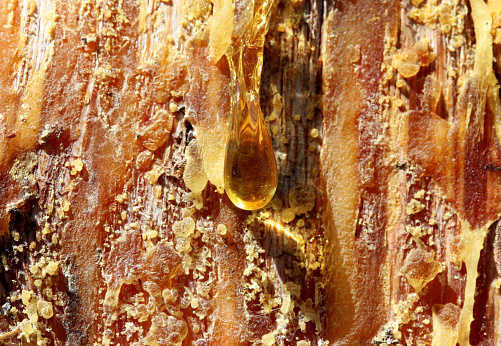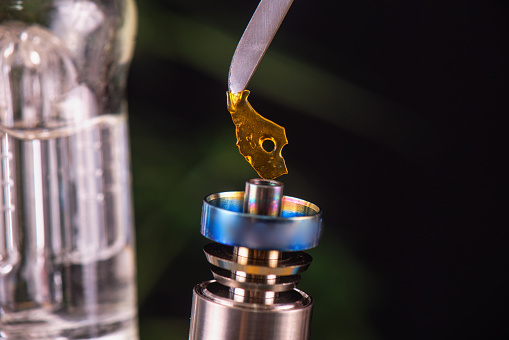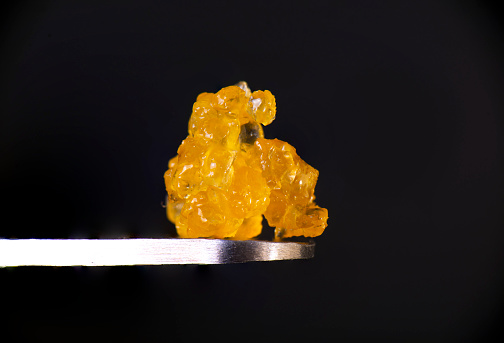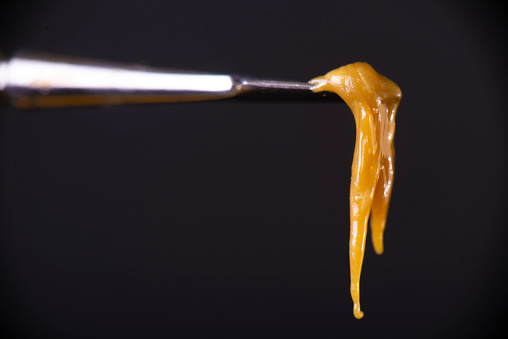Cannabis consumption keeps changing as more research goes into the industry. Concentrates, also known as extracts, have been growing in popularity recently and are now becoming mainstream. Rosin is one of the cannabis concentrates that have become so popular, with resin being the other extract.
Unfortunately, many are still in the dark on this extract because there is ongoing research on these cannabis concentrates. So, what is rosin? This definitive guide gives more details about this extract. It contains an overview of rosin, its use, concentrate extraction, and much more. Read it to the end to better understand rosin and make informed decisions when using it.

Overview: What Is Rosin?
Rosin is a solid form of live resin, a sticky substance derived from solventless extraction, which entails applying heat and pressure to cannabis plant material. It’s also known as solventless hash oil (SHO). The plant material used as input can be either dry sift hash, cannabis flower, or ice water hash, also known as bubble hash.
Rosin was first introduced to the cannabis community in 2006 by Compashon through ICMag. However, it started gaining popularity in 2015 as Phil Salazar, alias Soilgrown, started making and taking pictures while trying to use a lower-quality hash.
The discovery was accidental because Phil didn’t expect the outcome when pressing the hash. He only noticed that the process produced resin and left the hash dry. After putting the hash between parchment paper and pressing it against a hot dab, the rosin formed.
Later on, he used a hair straightener to perfect the process. Professionals have so far commercialized the process and are using the industrial press to extract different types of rosin.
Different Types Of Rosin
This cannabis extract comes in three different types depending on the source material. Some input materials used in making rosin include flowers or nugs, hash, kief, and trim. The outcomes are as follows:
-
Flower Rosin
This is a type of rosin made using fresh CBD flowers. You can only achieve this optimal quality of flower rosin if the flower is dried and cured—a process that removes excess moisture before pressing. Pressing fresh frozen flowers or those that aren’t cured produces undesirable extract with a soup-like consistency.
-
Hash Rosin
Hash rosin is an extract of ice water hash. This rosin can attain the highest gold standard for solventless extraction since the starting material has been concentrated beforehand to eliminate plant matter. As a result, the outcome is pure and potent rosin.
Live rosin is a type of hash rosin extracted from fresh frozen cannabis that is stored after harvest until ready for processing instead of dried flower. The end product has a better flavor and aroma profile since the input plant material isn’t cured or dried.
Instead, the frozen cannabis undergoes ice water hash extraction, a process that isolates the trichomes. From there, the ice water hash can be pressed using a rosin press to produce live rosin with better flavor and more terpenes.
Bubble hash rosin is another type of hash rosin that’s derived from solventless concentrate. This cannabis concentrate is made of trichome heads or resinous glands, separated from the plant material using extremely cold water and filtered using filter bags.
-
Sift Rosin
This concentrated form of cannabis is a product of dry sifts hashish as input material. The process entails removing all the rosin in cannabis by sifting its trim. It’s more potent than flower rosin but comparatively less than hash rosin.
Rosin Extraction Process
Extraction of rosin is fast because, unlike Butane Hash Oil (BHO), it does require an extra vacuum oven that purges residual solvents. This process entails the simultaneous application of heat and pressure and was initially used to make rosin for violin bows. You can do it whether you are a cannabis enthusiast or a professional.
There are special heated plates you will use in this extraction. Using high pressure, you will put the starting material between the plates and squeeze the resinous sap onto parchment paper. This extraction method is easier and produces a closed loop extraction system rosin from source material without losing terpenes.
Using a rosin press allows you to control the temperature, pressure, and time. It helps to note that higher temperatures darken the end product but increase yield. In contrast, low temperatures lighten the rosin and give it more flavor.
There are different types of rosin presses you can use, with the difference being how to press rosin using it. The following are common types:
-
Manual Rosin Press
This rosin press is user operated and requires a twisting mechanism to apply pressure. This extractor’s pressed rosin quality is easy to control since you can regulate the temperature and pressure. Note that you must have heat-resistant gloves to prevent accidental burns. However, you must be ready for labor intensity to extract rosin from the starting material.
-
Hydraulic Rosin Press
These rosin presses use compressed fluids and require your input even though their hydraulic cylinders lessen the workload. You must control the cylinder using either a foot pump or a hand pump.
-
Pneumatic Rosin Press
Pneumatic presses use compressed air and are the least labor-intensive. Using them is straightforward, even for novices in rosin extraction. It entails placing your plant material between the plates, setting the pressure, and activating the cylinder by pressing a button.
You can extract this cannabis concentrate from the flowers with these professional presses. However, you can’t sell it in the USA legal market due to its unmatched purity.

Can You Create Rosin In A DIY Setup?
Yes, you can create a DIY setup to press rosin at home. The extraction is straightforward and safe, although you must have a pair of heat-resistant gloves since you will use hot iron. You will need cannabis flower or cured marijuana, parchment paper, and a rosin press. Other necessary items include scissors, a dab tool, and a container to store the pressed rosin. However, the press can be costly hence the need to improvise.
You will need a clamp and hair straightener to create a makeshift rosin press. Pressing rosin this way is similar to a conventional press, with the difference being a hair straightener as the heat source. You will use the heat source and clap to put heat and pressure. But, it would be best to note that the final product won’t be pure compared to making rosin using the press. In addition, the yield will be lower.
THC Concentration In Rosin
Commercially pressed rosin ranges between 75% to 85% THC, while the homemade ones can range from 40% to 60% THC. The amount of THC depends on the plant material you use in making rosin. For instance, the medical strain contains a comparatively higher THC percentage.
How To Use Rosin?
It’s commonly consumed by heating in a quartz chamber and inhaling as vapor, known as dabbing. There are also other ways you can consume rosin. The popularity in the cannabis community can be attributed to the methods of consumption that deliver high potency.
Most consumers vaporize rosin. However, you can use a glass bowl, a joint, or a dab rig. These items are essential because heating rosin to convert THCa to THC increases its potency. You can also choose to vape or consume it in edibles besides smoking.
To use a dab rig, you will heat the bowl and inhale the vapor through a mouthpiece. You will be placing rosin wax in the bowl as you dab. The other methods, such as joints, are straightforward since you roll the wax over parchment paper and light it. While at it, it would be best to start with a small dose and increase intake as you get used to taking rosin.
How To Store Rosin?
How you store rosin matters a lot since it can affect its purity. You must use an air-tight glass container to minimize the possibility of a chemical reaction. In addition, it would be best if you reduce light exposure and heat. You can keep it under room temperature if you are a regular user, but if not, it would be best to freeze it.
Difference Between Rosin And Live Resin: The Most Popular Cannabis Concentrates
These two are the most popular hemp concentrates. However, many users confuse them due to their honey-like appearance. Below are what can help you to differentiate them.
-
Production Process
Making live rosin entails pressing frozen cannabis under heat and pressure. Many consider this concentrate the purest compared to other concentrates. In comparison, producers manufacture the resin by cryogenically freezing the input material and then extracting it using propane or butane as solvents. The process produces CBD, delta-8 THC, or delta-9 THC.
Most consumers consider live resin unnatural because of the solvents used in extraction. Nevertheless, it will help to know that the manufacturers remove the residual solvents before availing in the market. Using a hair straightener and clamp, you can’t produce this concentrate at home due to its complex extraction.
- Consumption Method
Unlike live rosin, you can’t consume resin as an edible. This is because its extraction doesn’t entail heating hence the need to heat it to break down THCa in THC. In addition, live resin doesn’t stick on parchment paper, making it challenging to roll it into a joint using this material.
-
Taste
Taste also sets these concentrates apart. While live rosin has a rich terpene profile, live resin still beats it in terpenes richness. This is because the heat used in rosin extraction tempers the terpenes. However, it’s still comparatively higher than other concentrates like shatter.
FAQs Regarding Rosin
Is possession and use of rosin legal?
The legality of possession and production of rosin varies among states depending on marijuana laws. In addition, it also depends on the rosin’s compounds. For instance, CBD rosin, delta-8 THC rosin, and delta-9 THC rosin are legal in some states, provided that they are extracted from the hemp plant that adheres to the 2018 Farm Bill rule.
Why is rosin sought after by many?
This concentrate’s demand is high due to its natural terpenes, easy production process, and different ways of consumption. However, you must know how to choose the best dab tool. As such a tool can enjoy your rosin at home. In addition, you can also take it as an edible because its THC is readily activated.
Is rosin safe to consume?
Yes, rosin is safe to consume owing to its solventless extraction. The end product is pure. However, you should be cautious when pressing rosin at home because of plant contaminants. Additionally, you should carefully choose your products, such as parchment paper. It will be best to use unbleached parchment paper to avoid contaminating your rosin.
How many rosin dabs can you get in the production process?
You will get fewer rosin dabs compared to the amount of cannabis you will use. However, your end product will be much more potent. You can use high-quality plant material, check moisture content, and pre-heat it to increase yield.
What are the side effects of rosin?
Rosin has side effects like any other cannabis product. The side effects include visual disturbance, palpitations, drowsiness, and an altered sense of taste. Some that you can experience are excessive sleepiness and dry mouth. This calls for dose regulation as you monitor the effects on your body.
Who shouldn’t use rosin?
Pregnant women or those breastfeeding shouldn’t use rosin because it can stay in their system and possibly affect the baby. In addition, those with underlying medical conditions should avoid this concentration or only use it after consulting a qualified doctor.

Conclusion: Which Type Of Rosin Press Is Best?
Rosin has gained notoriety recently owing to its extraction method and rich terpene profile. In addition, it is purer than any other extract. For that reason, the high demand will most likely continue as more users get acquainted. And with the ease of the entire process, even cannabis enthusiasts can make rosin at home.
However, it would be best to know more about this highly sought-after concentrate before you embark on making your rosin. Note that the input material you use determines the plant contaminants in your final product, hence the need for caution. So, if you are asking, what is rosin? It would be best to use the information in this guide to help you understand this concentrate, its benefit, and its legality.




